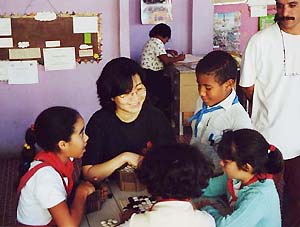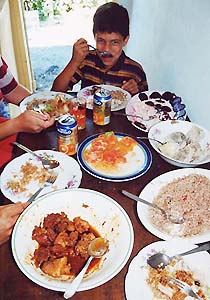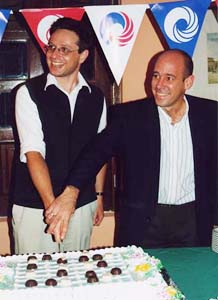 |
|
| Cuba | |
 |
|
| Cuba | |
 |
|
| I escaped from the snow-covered streets
of Milan to Cuba in the Caribbean! My readers probably think that 'teaching' was just a pretext and that I came here just to have fun. Well, to be honest, there are times I feel like just lolling around on a beach, so I was in the mood to enjoy myself. But life is not so easy -- all I got of the ocean was a glimpse in passing. Let me tell you what really happened. |
|
| The go association of the socialist country
of Cuba came into being eight years ago.
There's a go population of nearly a thousand,
centred on the capital of Havana. About seventy
per cent are children and teenagers. The
strongest players are shodans, of whom there
are several. This year I started out with the Havana New Year tournament, then traveled to schools and go clubs in four provinces to teach. |
|
| The total area of Cuba is about the same
as Honshu. Administratively, it is split
up into 14 provinces, and go activity is
also carried out on a provincial basis. In
provinces where go has caught on, it is taught
as a regular class in elementary schools
three times a week. Each school has a go
teacher whose salary is paid by the state.
Isn't that amazing? |
|
 |
|
| Apparently go instruction in schools started
two years and several months ago. Teaching
is centred on the 9x9 board. If the state
decides to support the game in a big way,
it could make great strides in Cuba the way
it has in China. The future of Cuban go is
unlimited. In this country there's a dual price structure: dollar prices for foreigners and peso prices for locals. When foreigners change money at a bank, the rate is $1 = 1 peso, but when Cubans change money the rate is $1 = 20 pesos. In short, they try to adjust the differences between local and overseas prices with this 2000 per cent differential. |
|
| Actually, apart from a limited range of goods
and services, like fresh food, transport,
and pharmaceuticals, all prices are in dollars,
so life is very tough for Cubans, whose average
salary is $15. Putting shortages aside, even
when goods are available, they're too expensive
for locals to buy. |
|
 |
|
| There are different prices not just for goods,
but for taxis, too. There are two kinds of
taxis: ordinary vehicles charging dollar
fares for foreigners, and broken-down vehicles
charging cheap rates for Cubans. Again the
difference in fares is a factor of 20. For
this reason, it's forbidden by law for Cubans
and foreigners to ride together. That meant
that I couldn't go places together with my
go friends. |
|
| Even the cheaper taxis are too expensive
for the locals. So the top means of transport
is one that needs no money: hitchhiking!
The streets are full of people covered in
exhaust gas waiting for something. |
|
| But the most inconvenient of all was the toilets! (Excuse me for bringing up a crude topic, but I can't pass over it.) | |
| Basically, there's no toilet paper or hot
water (not even at the international airport).
On top of that, there's no water at all at
over half of the toilets. There are no doors,
the lights don't work (they don't even have
light bulbs), there's nothing of anything,
yet there's always someone on duty to collect
tips. It's maddening! |
|
 |
|
| In Havana, I was helped out by as Cuban
family.
This was a large family, made up of
the grandfather
and grandmother (younger than my parents)
at the head, the son and his family,
twin
grandchildren, and many relatives living
nearby. |
|
| This must have been a middle-class family: they had a TV (there are just two national channels in Cuba), a telephone, a washing machine, and their house was clean and tidy. But, wouldn't you know it, there was no toilet paper. | |
 |
|
| No, strictly speaking, that's not true -- there were the yellow pages of telephone directory, an American one, for some reason). Of course, I was prepared with my own tissues, so this didn't bother me, but the next day I found a roll of brand-new toilet paper in my room. | |
| It made me sad to think of the trouble they
must have gone to to procure it. Although
I greatly enjoyed the warmth of their family
life and their delicious meals, I had mixed
feelings. |
|
| This was a trip that made me think about
a lot of things -- there was not only sweat,
but also many tears. But I won't let it put
me off: next time I'll take loads of tissues
and visit Cuba again. (March 2001, Monthly Go World) |
|
 |